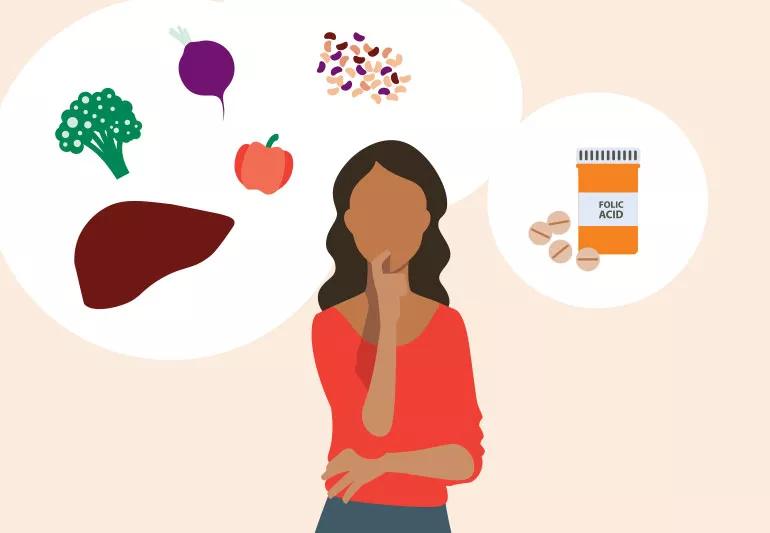Folate occurs naturally in foods, while folic acid is man-made — but both are essential

Image content: This image is available to view online.
View image online (https://assets.clevelandclinic.org/transform/d304bca4-5d9e-4e92-811e-b4861191c33e/folate-folic-acid-1451238224-770x533-1_jpg)
Person wondering about folate acid versus folic acid.
Folate and folic acid are forms of vitamin B9 that support healthy cell growth and development, especially in pregnancy. A folate deficiency can lead to serious complications, including birth defects and anemia.
Advertisement
Cleveland Clinic is a non-profit academic medical center. Advertising on our site helps support our mission. We do not endorse non-Cleveland Clinic products or services. Policy
Folate occurs naturally in foods, and refers to all types of vitamin B9, including folic acid. Folic acid is a synthetic (man-made) form of B9 found in supplements and added to (fortified) foods.
“It can be difficult to maintain adequate levels of B9 over time because it’s not stored by your body,” says dietitian Julia Zumpano, RD. “Folate and folic acid give you two options to increase your vitamin B9 intake, and protect your health and the health of the fetus, if you’re pregnant.”
For people of all ages, it can be hard to maintain adequate B9 levels and meet the recommended daily amount without taking supplements. People who are pregnant or those planning to conceive need folic acid to reduce the risk of birth defects of the brain and spine (neural tube defects).
The terms “folate” and “folic acid” are often used as if they’re identical, but they’re not. Both are forms of vitamin B9. Vitamin B9 is one of eight B (B-complex) vitamins that help make DNA and red blood cells, which carry oxygen throughout your body. This essential nutrient supports healthy cell growth and function and boosts your immune system. It can also prevent health problems like anemia.
“Folate and folic acid are both B9 vitamins that benefit your health in similar ways,” Zumpano says. “But they have important differences you need to be aware of, especially if you’re pregnant or have been diagnosed with a folate deficiency.”
Advertisement
Here are seven key differences:
The type of vitamin B9 and amount that’s best for you depends on several factors, including your age. Most people can safely increase their intake of folate that occurs in foods, but it’s wise to be cautious with supplements.
The recommended daily amount of folate is:
| Age | Recommended Daily Amount |
|---|---|
| 6 to 11 months* | 80 mcg |
| 1 to 3 years | 150 mcg |
| 4 to 18 years | 200–400 mcg |
| Over 18 years | 400 mcg |
| 14+ years and pregnant | 600 mcg |
| 14+ years and lactating | 500 mcg |
| Age | |
| 6 to 11 months* | |
| Recommended Daily Amount | |
| 80 mcg | |
| 1 to 3 years | |
| Recommended Daily Amount | |
| 150 mcg | |
| 4 to 18 years | |
| Recommended Daily Amount | |
| 200–400 mcg | |
| Over 18 years | |
| Recommended Daily Amount | |
| 400 mcg | |
| 14+ years and pregnant | |
| Recommended Daily Amount | |
| 600 mcg | |
| 14+ years and lactating | |
| Recommended Daily Amount | |
| 500 mcg |
*Adequate intake
Source: 2020-2025 Dietary Guidelines for Americans
You may need additional folic acid if you’re on certain medications or have:
“Talk to your healthcare provider if you think you need more folate or folic acid,” advises Zumpano. “A blood test can confirm a B9 deficiency, and you can make a plan to maintain your good health.”
Advertisement

Sign up for our Health Essentials emails for expert guidance on nutrition, fitness, sleep, skin care and more.
Learn more about our editorial process.
Advertisement
The popular skin care ingredient can help smooth, brighten and strengthen your skin
Though it was once used as a cholesterol-lowering medication, niacin is no longer a recommended treatment
Some protein-containing foods are known to be good sources of biotin — but there are also likely other foods that just haven’t been studied yet
This essential nutrient helps convert food into energy, but don’t expect wonders for your nails and hair
This important B vitamin has benefits for your heart, brain and skin
Taking supplements with biotin can cause inaccurate lab test results
If you have low B12 or a true deficiency, these shots can work wonders
Pantothenol is a powerful moisturizer and can help repair damaged skin and hair
Although it could be used as a moisturizer, this new trend is not recommended
Communicating clear limits helps protect your time, energy and emotional well-being
High cholesterol can be genetic, but testing and treatment can lower your heart disease risk